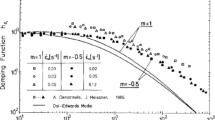Abstract
The concept of a configuration-dependent tensorial drag (or mobility) coefficient developed some sixteen years ago is presented in a more generalized manner. In particular, the special case of a one-mode model is discussed. This is shown to be equivalent to the one-mode Leonov model as well as to a recently published model of Dashner and VanArsdale.
For an isotropic mobility tensor, the model is shown to include not only the simple upper convected Maxwell model but also those generalizations in which the shear modulus and the relaxation time are introduced as functions of either the present configuration or the configuration history, the latter case covering the model of Acierno et al. The introduction of a non-isotropic mobility, which is linearly related to the configuration tensor, enables at least a simple qualitative description of a number of well-known flow properties to be given; namely, finite extensional viscosity, shear thinning and non-disappearing second normal-stress difference, non-linear relaxation and stress-overshoot in transient shear flows. It is further shown that models in which the shear modulus and the relaxation time are introduced as functions of the rate of strain tensor, or in which objective time derivatives other than the upper convected derivative are used, are not compatible with this approach.
Finally, a short discussion of multi-mode models is given in which emphasis is placed on the problem of whether the different modes can be considered to be independent, as is the case in nearly all existing models, or whether the concept of entangled network structures requires coupling of these modes. The latter would mean that mobility tensors and shear moduli of every configurational mode would have to be considered to depend on the full set of configuration tensors.
Similar content being viewed by others
References
Giesekus, H., Rheol. Acta5, 29–35 (1966).
Bird, R. B., O. Hassager, R. C. Armstrong, C. F. Curtiss, Dynamics of polymeric liquids, Vol. 2: Kinetic theory, Wiley (New York 1977).
De Gennes, P. G., J. Chem. Phys.55, 572–578 (1971).
Doi, M., S. F. Edwards, J. Chem. Soc., Faraday Trans. II,74, 1789–1801, 1802–1817, 1819–1832 (1978);75, 38–54 (1979).
Curtiss, C. F., R. B. Bird, J. Chem. Phys.74, 2016–2025, 2026–2033 (1981).
Dashner, P. A., W. E. VanArsdale, J. Non-Newtonian Fluid Mech.8, 59–67 (1981).
Leonov, A. I., Rheol. Acta15, 85–98 (1976).
Lodge, A. S., Trans. Faraday Soc.52, 120–130 (1956); Elastic liquids, Academic Press (New York 1964).
Kaye, A., Brit. J. Appl. Phys.17, 803–806 (1966).
Acierno, D., F. P. La Mantia, G. Marrucci, G. Titomanlio, J. Non-Newtonian Fluid Mech.1, 125–146 (1976).
Giesekus, H., The physical meaning of Weissenberg's hypothesis with regard to the second normal-stress difference, in: J. Harris (ed.), The Karl Weissenberg 80th Birthday Celebration Essays, East African Literature Bureau (Campala, Nairobi, Dar Es Salaam 1973) pp. 103–112.
Giesekus, H., J. Non-Newtonian Fluid Mech.11, 69–109 (1982).
Giesekus, H., J. Non-Newtonian Fluid Mech. (submitted).
Leonov, A. I., A. N. Prokunin, Rheol. Acta19, 393–403 (1980).
Oldroyd, J. G., Proc. Royal Soc. London,A 245, 278–297 (1958).
Phan-Tien, N., R. I. Tanner, J. Non-Newtonian Fluid Mech.2, 353–365 (1977), N. Phan-Tien, J. Rheol22, 259–283 (1978).
Author information
Authors and Affiliations
Rights and permissions
About this article
Cite this article
Giesekus, H. A unified approach to a variety of constitutive models for polymer fluids based on the concept of configuration-dependent molecular mobility. Rheol Acta 21, 366–375 (1982). https://doi.org/10.1007/BF01534296
Received:
Issue Date:
DOI: https://doi.org/10.1007/BF01534296




